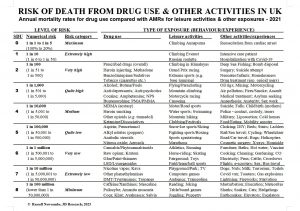The use of magic mushrooms dates back thousands of years, so it’s understandable that they’ve picked up a fair few myths along the way. From sending you crazy to being a purely recreational party drug, let’s look at some of the most common misconceptions surrounding their use.
Mushrooms are harmful/dangerous
Much of the prohibitionist rhetoric throughout the 20th century would have you believe that magic mushrooms are incredibly dangerous and even deadly. From suggestions that they can cause brain damage or make you go entirely insane.

However, the reality is that magic mushrooms are possibly one of the safest substances to consume. Looking at Dr. Newcombe’s ‘Drug Mortality Risk Chart’, the Annual Mortality Rate for mushrooms is similar to that of playing board games or reading a book. According to Professor David Nutt, there have been next to no deaths from mushrooms, apart from those linked to misadventure – of course users are advised not to trip in areas where they might be at risk.
As well as this, mushrooms are not linked to enduring changes in people’s mental state. Although they might exacerbate psychosis symptoms in people who are predisposed to psychosis, mushrooms are not likely to produce permanent negative changes. Of course there is always the propensity for experiencing a ‘bad trip’ and that’s why it’s important to ensure that both the set and setting are correct before taking mushrooms.
In fact, magic mushrooms have been linked to a number of positive changes in the people who take them in therapeutic settings – something we’ll explore later on.
Mushrooms are addictive
Similar to the previous myth, the idea that magic mushrooms are addictive also appears to be a popular prohibitionist narrative. However, this is very far from the truth.
In reality, magic mushrooms appear to have a very low potential for addiction in humans. Drug Science note that there have not been any significant cases of people becoming negatively addicted to mushrooms.
Interestingly, the chemical makeup of mushrooms actually appears to prevent physical addiction. Psilocybin molecules activate the body’s 2A serotonin receptors without interfering with the brain’s existing serotonin supply. This prevents the prospect of upregulation or downregulation of neurotransmitters and reduces the potential for addiction.
The body’s tolerance also maxes out as soon as magic mushrooms are ingested, meaning there is a high tolerance for repeated use. Therefore, it is very hard to become addicted to magic mushrooms, as repeated doses in a short period of time provide far diminished effects.
Mushrooms are a milder form of LSD
As they are both classed as hallucinogens, some people also believe magic mushrooms to be a milder, less potent form of LSD. Whilst these two drugs are often accompanied by the same side effects and cause their users to trip, they are both quite different.
Anecdotal evidence suggests that tripping on shrooms vs tripping on acid can provide users with a wholly different experience. Whilst mushrooms are said to induce a more mellow and chilled out experience, it’s reported that LSD can cause a more stimulating and uplifted high. Mushrooms are also linked to a greater ‘body high’, sometimes accompanied by feelings of nausea.
Microdosing causes psychoactive effects
Since the pandemic, microdosing mushrooms has become an increasingly popular trend – most noticeably on social media such as TikTok. However, there seems to be some confusion about what microdosing is and its effects on the body.
The largely accepted definition of microdosing is taking around a fifth to a twentieth of a standard recreational dose. However, as the dose is so small the intention isn’t to get ‘high’ or induce a trip. Instead, microdosing causes very subtle, almost sub-perceptual changes to promote positive health and wellness effects from improvements in mood and focus to enhanced creativity.
Mushrooms have no therapeutic value/ are purely recreational
Much of the portrayal of magic mushrooms in the media focuses on their use in recreational settings. Even more so, in places where they’re illegal, magic mushrooms have been deemed to possess no therapeutic value. However, this couldn’t be further from the truth.
Research is now considering and exploring the potential medical applications of magic mushrooms in the treatment of a range of mental illnesses and disorders, including PTSD, anorexia and even gambling addiction. The results of these studies have been largely positive, particularly in the case of treatment-resistant depression. Findings correlate the use of psilocybin-assisted therapy with the easing of depressive symptoms, and in some instances remission.
This piece was written by Volteface Content and Media Officer Megan Townsend. She is particularly interested in the reform of drug legislation, subcultural drug use and harm reduction initiatives. She also has an MA in Criminology from Birmingham City University. Tweets @megant2799.
